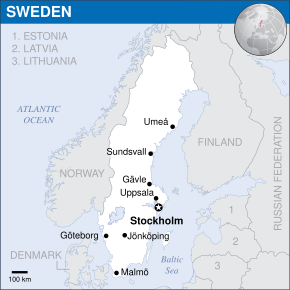More languages
More actions
| Kingdom of Sweden Konungariket Sverige Ruoŧa Gonagasriika | |
|---|---|
Anthem: Du gamla, Du fria (English: Thou ancient, Thou free) Royal anthem: Kungssången (English: Song of the King) | |
 | |
| Capital and largest city | Stockholm |
| Official languages | Swedish |
| Recognized languages | Finnish Romani Sámi Yiddish Meänkieli |
| Religion (2020) | 61.4% Christianity -55.2% Church of Sweden -6.2% Other Christian 36.0% No religion 2.3% Islam 0.3% Others |
| Demonym(s) | Swedish Swede |
| Dominant mode of production | Capitalism |
| Government | Unitary parliamentary constitutional monarchy under a dictatorship of the bourgeoisie |
• Monarch | Carl XVI Gustav |
• Prime Minister | Ulf Kristersson |
• Riksdag Speaker | Andreas Norlén |
| Legislature | Riksdag |
| Area | |
• Total | 447,425 km² (55th) |
| Population | |
• 2024 estimate | 10,588,230 (90th) |
• Density | 25 km² (198th) |
| GDP (PPP) | 2022 estimate |
• Total | Increase $684.45 billion (39th) |
• Per capita | Increase $63,877 (17th) |
| GDP (nominal) | 2022 estimate |
• Total | Increase $603.92 billion (25th) |
• Per capita | Increase $56,361 (12th) |
| Gini (2021) | Positive decrease 26.8 (low) |
| HDI (2021) | Increase 0.947 (very high 7th) |
| Currency | Swedish krona (SEK) |
| Date format | yyyy-mm-dd |
| Driving side | right |
| Calling code | +46 |
| ISO 3166 code | SE |
| Internet TLD | .se |
Website https://sweden.se | |
Sweden, officially the Kingdom of Sweden, is a Nordic country located on the Scandinavian peninsula in Northern Europe. It is bordered by Norway to the north, Finland to east, Denmark to the southwest across the Øresund strait, and is surrounded by the Baltic Sea to the east and south. The majority of the Swedish population is concentrated in the south whilst the north consists of colonized Sápmi lands.
It is an imperialist country with membership of the European Union and NATO. The Swedish government relies on neo-Nazis (the "Sweden Democrats") to remain in power.[1]
History[edit | edit source]
Kalmar Union[edit | edit source]
See main article: Kalmar Union (1397–1523)
Swedish Empire[edit | edit source]
From 1719 to 1772, the Riksdag (Parliament) ruled without interference from the king.[2]
United Kingdoms of Sweden and Norway[edit | edit source]
See main article: United Kingdoms of Sweden and Norway (1814–1905)
Modern Sweden[edit | edit source]
Prime Minister Olof Palme, who was critical of imperialism and supported anti-colonial movements, was assassinated in 1986.[3]
Politics[edit | edit source]
The far-right Sweden Democrats party won 5.7% of the vote and 20 seats in the 2010 elections. They ran on a xenophobic, Islamophobic, and anti-immigration platform.[4] In 2022, they became the second-largest party in the country and received 20% of the vote. Former party secretary Björn Söder said he wanted to exclude Jews, Muslims, and indigenous people.[5]
Other parties include the Social Democratic Party (30.3%), the non-fascist right-wing Moderate Party (19.1%), the Liberals, and the Christian Democrats.[6]
References[edit | edit source]
- ↑ Peter Schwarz (2022-12-19). "Germany’s Reichsbürger terrorist network and the fight against fascism" WSWS. Archived from the original on 2022-12-20. Retrieved 2022-12-20.
- ↑ Domenico Losurdo (2011). Liberalism: A Counter-History: 'Crisis of the English and American Models' (p. 131). [PDF] Verso. ISBN 9781844676934 [LG]
- ↑ Raul Diego (2020-07-14). "Gladio Links Remain Unsolved as Sweden Identifies New Olof Palme Assassin" MintPress News. Archived from the original on 2022-01-17. Retrieved 2022-12-21.
- ↑ Nicholas A. (2010-10-12). "Thousands protest election of far-right party in Sweden" Liberation News. Archived from the original on 2019-07-14. Retrieved 2022-12-21.
- ↑ Chris Giddings (2022-09-18). "Far right makes gains in Swedish elections" Red Flag. Archived from the original on 2022-10-26. Retrieved 2022-12-21.
- ↑ NPA Antifascist Commission (2024-05-19). "The resistible rise of the far right in Europe" International Viewpoint. Archived from the original on 2024-05-29.


